The Pioneers
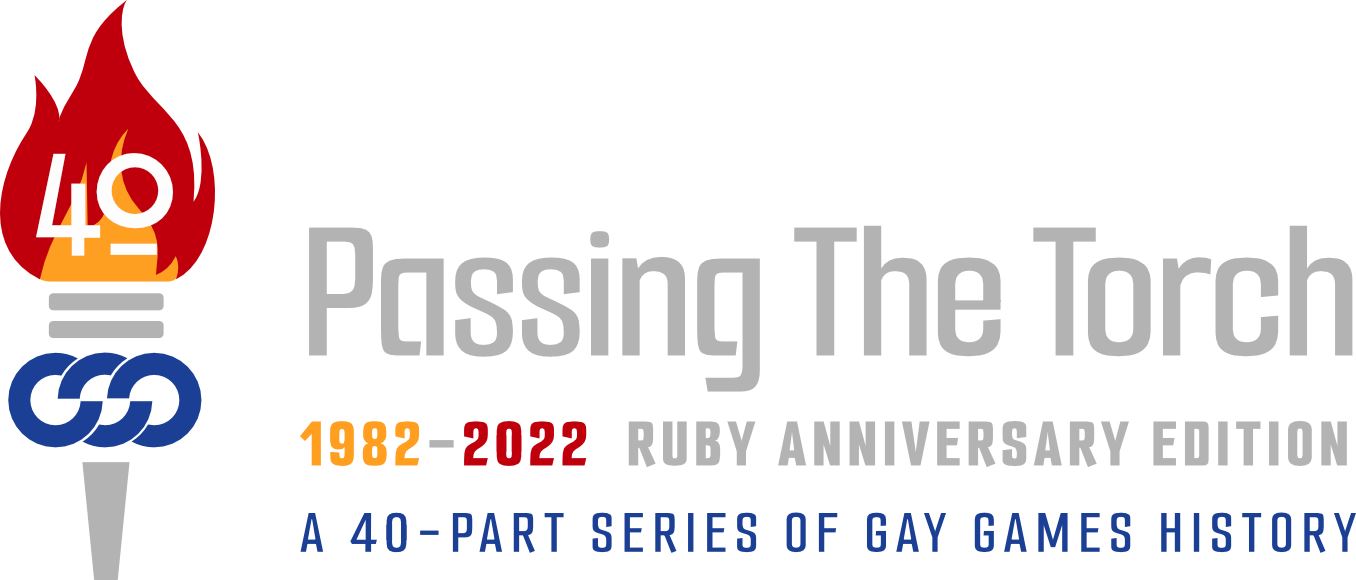
Produced and curated by Federation of Gay Games Archivist Doug Litwin and FGG Honourary Life Member Shamey Cramer
with Ankush Gupta, FGG Officer of Communications.
Read the entire "Passing The Torch" series as it is posted daily HERE.
Post 5 of 40 - 1 August - The Pioneers
“Passing The Torch: Ruby Anniversary Edition” is a factual timeline of the major events that have been part of the Gay Games evolution since its inception. The series will run from 28 July 2022 - one month before the 40th anniversary of the original Opening Ceremony at San Francisco’s Kezar Stadium - through 05 September, the anniversary of Gay Games I Closing Ceremony. All postings will remain online and available for viewing at the FGG website.
* * *
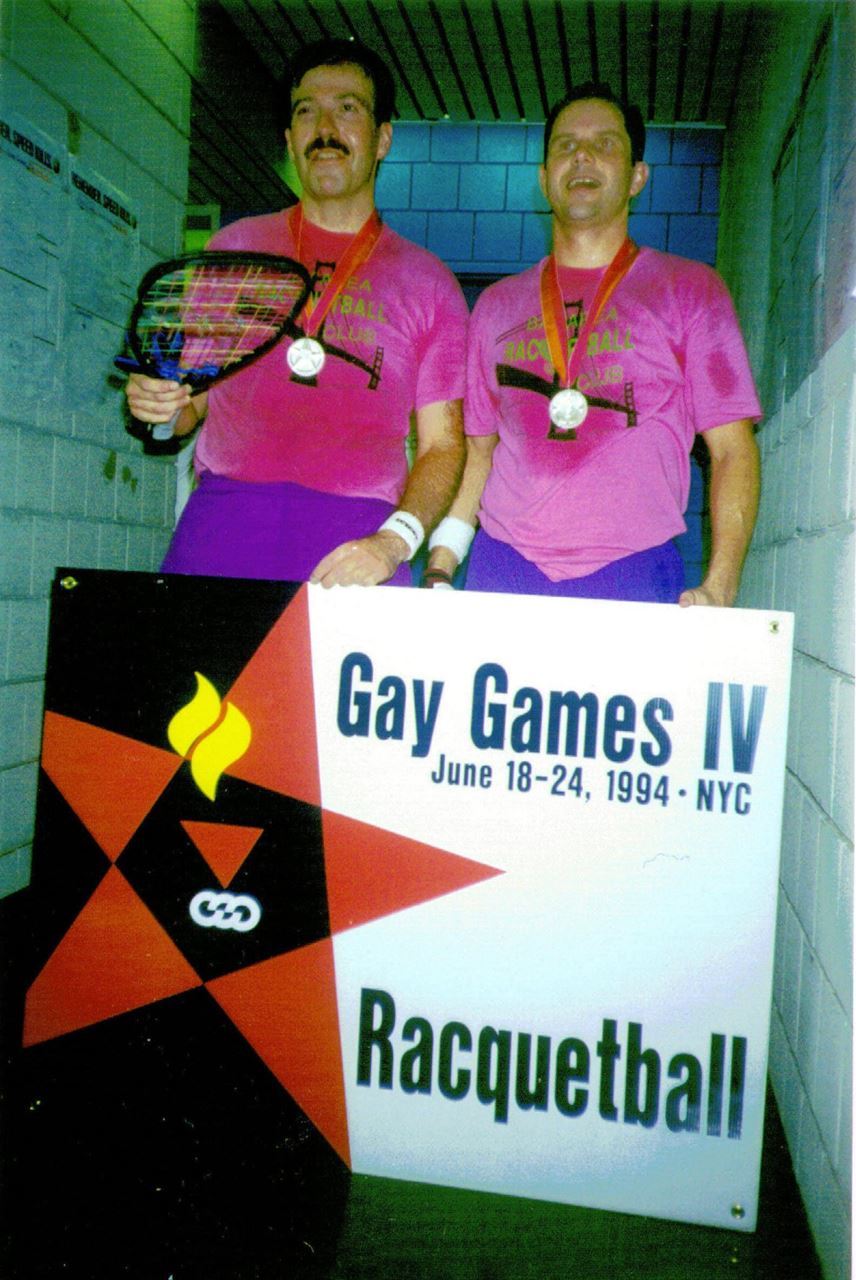
Doug Litwin (left) with Racquetball doubles partner Scott Miller at Gay Games IV in 1994
DOUG LITWIN: Despite my long history with the Gay Games, it still feels like I was a bit of a late arriver. I was living in San Francisco at the time of Gay Games I, having moved there in 1978, just a few months before the City Hall assassinations of Supervisor Harvey Milk and Mayor George Moscone. At that point, I was not fully engaged in the local gay community, and as such, I honestly was not even aware that this event was happening. I know… this might be hard to believe, but Gay Games I was a relatively small event. I regret not participating in 1982, as I could have met Tom Waddell and some of the other founders of this life-changing event.
* * *

L to R: Rand Wiseman-Curtright, Shamey Cramer, Phil Manciero, Chair John Logan, Christopher Street West L.A. Pride Sports Committee, 1984
SHAMEY CRAMER: The week of Gay Games I was the first time the various out-of-town team organizers had the chance to meet and interact. Beginning in October 1982, and continuing through 1985, ten co-chairs from across North America joined with Tom Waddell to engage in monthly conference calls. These individuals from Boston, Minnesota, Los Angeles, Toronto, and Vancouver created the International Gay Olympic Association (IGOA), an ad-hoc committee that Tom called for the creation of in the January 1982 Gay Olympic Games newsletter.
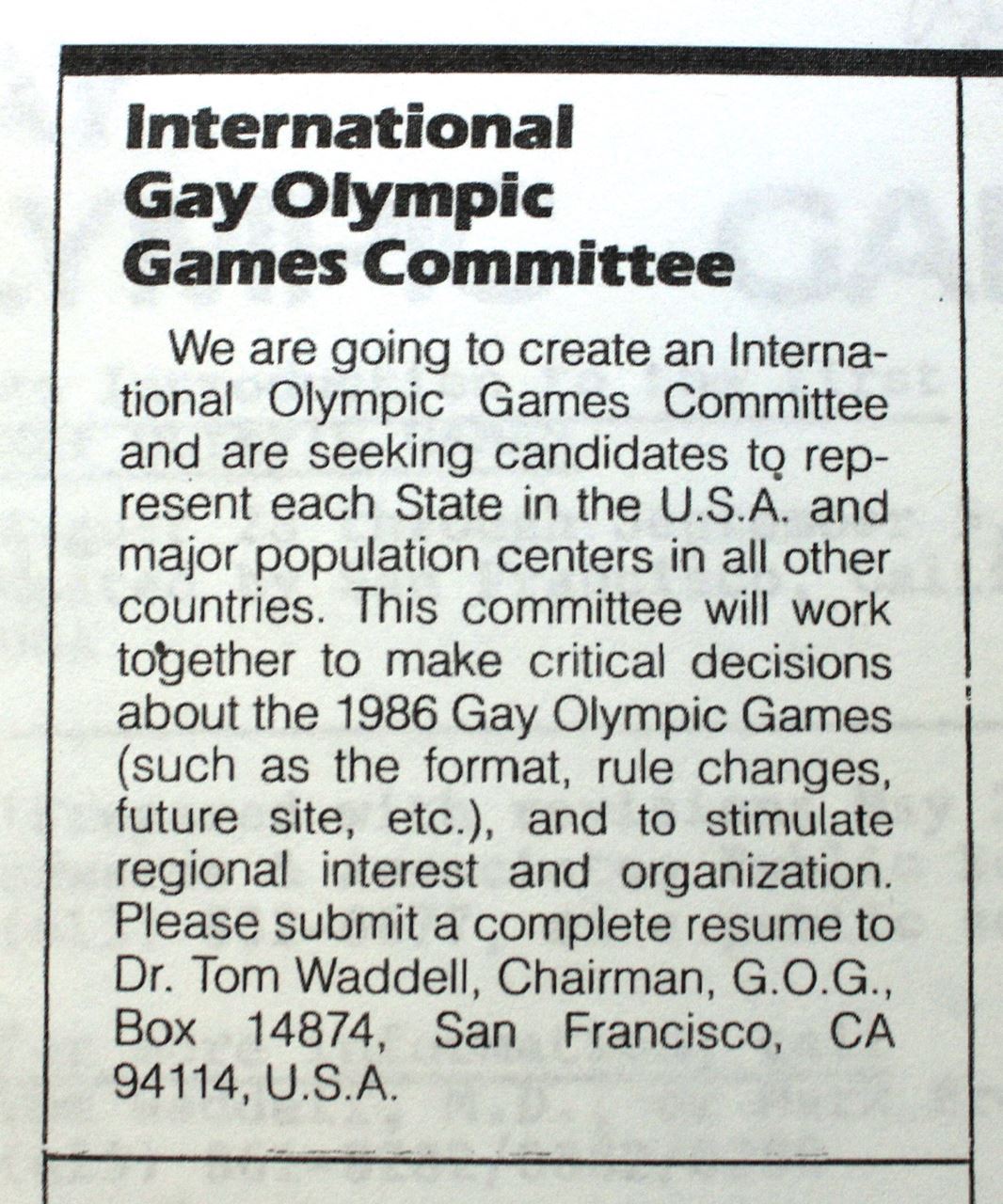
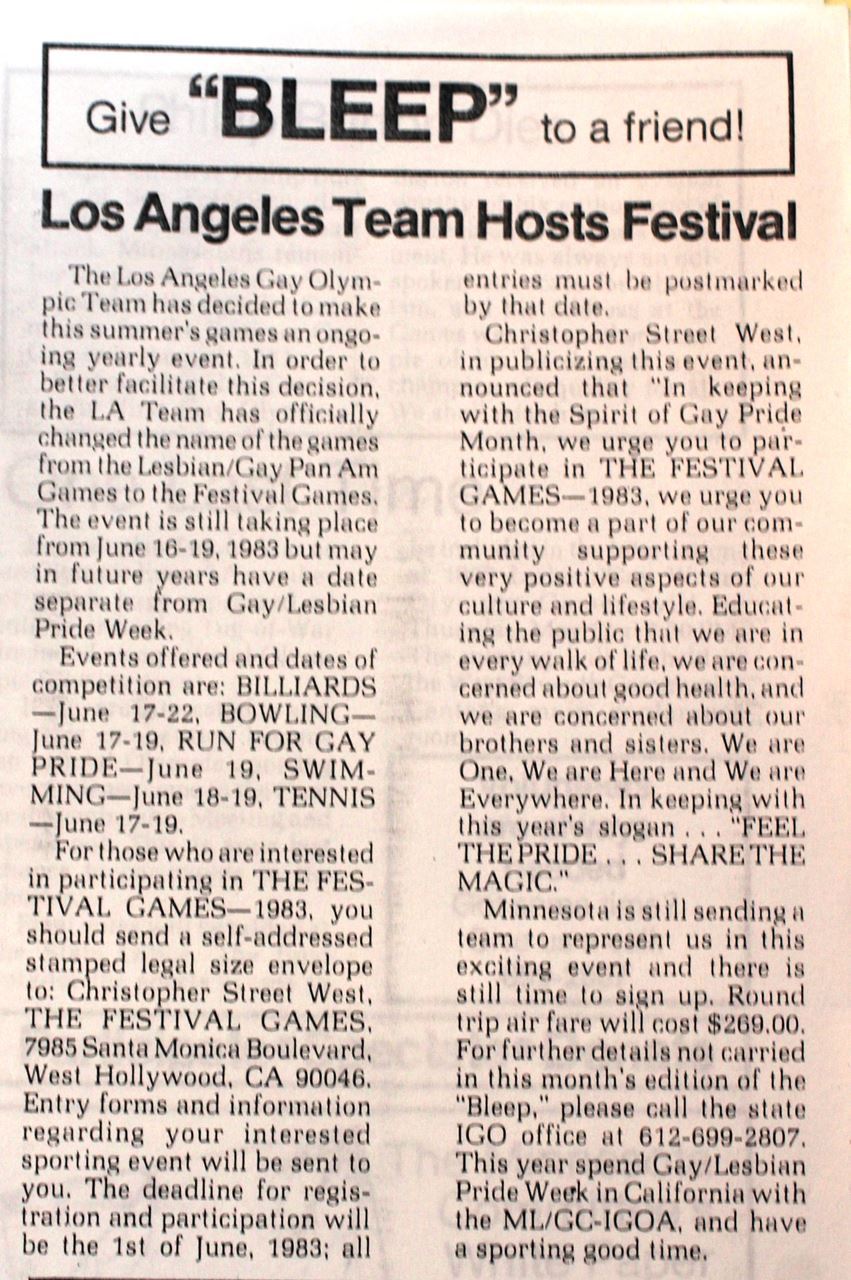
Two newspaper articles regarding the formation of the IGOA
The IGOA helped establish goals, philosophies, and benchmarks for the Gay Games; discussed how to go about creating a process to select future host cities; and developed and produced activities outside of the quadrennial event, which would once again be hosted by San Francisco for Gay Games II. With no precedent to guide them, Team Minnesota created a bid document to host a Lesbian and Gay Winter Olympic Games in January 1986, and published the quarterly Gay BLEEP Games newsletter; Team Los Angeles produced The Festival Games (1983-85), the first annual multi-sport festival hosted by the LGBTQ+ community; and representatives from Team Vancouver began separate discussions with Tom, which led to them hosting Gay Games III.
At the same time, many of the participants began to incorporate their own sports teams; and athletes and musicians created communication networks for those within their discipline. The 32 swimmers from Team Los Angeles created the West Hollywood Swim Club in October 1982, becoming the first U.S. Masters swim club whose mission focused on the inclusion of LGBTQ+ athletes and their allies; and seven bands met in Chicago to create their consortium, originally called Lesbian & Gay Bands of America and now known as Pride Bands Alliance.
San Francisco Arts & Athletics hosted the first Co-Chairs gathering in April 1983, which was attended by the IGOA representatives and other interested parties, including Peter Todd from Team Sydney. An update was given on the status of the lawsuit over the use of the word “Olympic,” with a robust discussion following as to what the name of the event should be called, and whether the word “Lesbian” should be added to the title. There was also a discussion on whether or not Gay Games II should even take place, given the growing AIDS crisis; and if so, whether or not a conference aspect should be added to discuss AIDS and other critical issues facing the community.
It was also at this meeting where Team Minnesota presented their Winter Games bid proposal, which secured the support of SFAA; and was selected to host a second Co-Chairs conference in January 1984. That way, team organizers could experience Minnesota during their annual Winterfest, which would coincide with the presentation of the Lesbian & Gay Winter Olympic Games two years hence.
Although more than a dozen representatives attended the 1984 co-chairs conference the following January in the Twin Cities, The Winter Games were not produced, given the struggle to secure resources while the community grappled with the darkest days of the AIDS crisis.
In 1985, I was informed I tested positive to the AIDS virus (a year before it became known as HIV), and told I had six months to two years to live – the standard prognosis at that time. I subsequently dropped out of everything and moved back to Chicago to be closer to my family, while still keeping my diagnosis a secret from any and everyone, including my closest friends and family.
* * *

Stacy van Scoyk (daughter of WH2O co-founder Chris van Scoyk) in front of the swimmers competing at the June 1983 Festival Games swim tournament at Beverly Hills High School. Stacy loved going to swim meets, and was considered the team's #1 Fan. When Stacy died in a 1992 auto accident, WH2O planted 18 Chinese Flame trees, in remembrance of her 18 years of life.
DOUG ORLOFF: After Gay Games I, a bunch of us wanted to keep that spirit going and we created the West Hollywood Masters Swim Team. The first few years, we had between 25-30 people on the team. Mark Chatfield was our coach. Some of the team had been on the LA team at GGI, and some were new. The first team had people who remained friends for years: Ron, Bill, Mike, Frank, Mark, Chris, Jim, Neal, Barry, Alan and many more. Raphael was the first president of the team and its prime mover. The first two years, I was the Vice President. We worked out together, had meals and social events, and looked after one another. There were tough times, too. When AIDS entered our lives, the pool we worked out in kicked us out because the neighborhood was sure we were going to give their kids AIDS. We eventually ended up at Beverly Hills High School.
Another remarkable event was the first Festival Games sports festival in June 1983, an official LA Pride event that happened annually between Gay Games I and Gay Games II. Ron and I chaired the swim meet at Beverly Hills High School, working with Rand Wiseman-Curtright, Phil Manciero, and Shamey Cramer from the Christopher Street West Sports Committee. We had swimmers from all over the country show up, including Hal Herkenhoff, who served as the Tournament Director for all of Gay Games II Aquatics.
* * *
Following is a transcript of comments Dr. Waddell made at the April 1983 town hall meeting that gathered individuals from San Francisco Arts & Athletics, the International Gay Olympic Association, and other team co-chairs and community members to discuss the future of the Gay Games Movement.
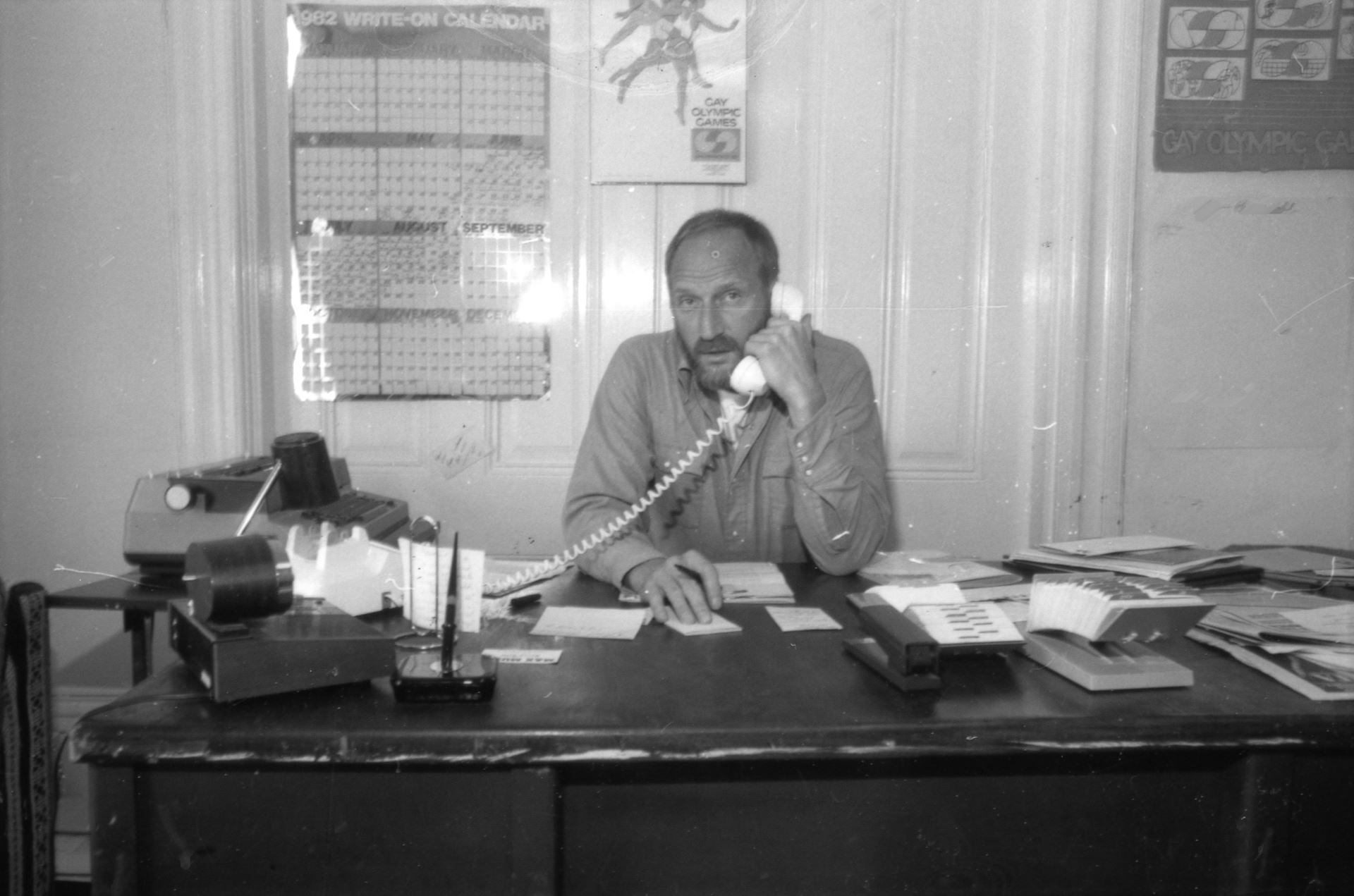
Tom Waddell in the Gay Games I office, 1982
TOM WADDELL: The first Games were a surprise to everyone. In spite of a relatively poor turnout, they were still successful in many ways. They demonstrated that a large number of Gay men and women participated admirably in a variety of individual and organized athletics. The Games demonstrated also that competition need not be an aggressive or threatening activity, but that it can be friendly, cooperative, and self-fulfilling.
The Games are successful in that they provided a great sense of unity and self-esteem. They were typified by serious but fun-loving men and women devoid all traditional stereotypes. For the week of the Games, we were who we said we were: athletes who happened to be Gay. The Games were successful in providing us with a sense of identity and a degree of visibility in a way which we've never experienced before.
And finally, to the astonishment of some cynics, we finished in the black. I view the success mostly in a way I call internal. And for that I mean, the impact was predominately in our own communities. Because of the enormous prejudice against Gay people as being legitimated, productive members of society and fully capable of athletic endeavor the Games were virtually invisible to the external world.
The only reaction to the Games outside of our communities came as a result of institutionalized homophobia brought to the event by the powerful and prestigious United States Olympic Committee. But, even in that instance their mockery of fair play and their Neanderthal attitude served us in no small way. While the general public may not have rallied to witness the Games they at least acknowledged the plight of the underdog.
We feel strongly, our committee, that there should be a Gay Games II, but we feel just as strong]y that we maintain a sound philosophy, that we continue the Games as an event that gives something new and something valuable and something worth teaching.
The first Games brought Gay athletes out of their closets, clearly an act of courage for the 1,300 men and women who participated in them. There have been Gay sports organizations for years and suddenly they are erupting into regional and national and even international competitions.
Plans for a Pan American Games and a Winter Gay Games are in progress. It’s wonderful to see. But sooner, rather than later, many of these competitions will have as a goal the reward of winning for the sake of supremacy of one group over another. That seems to be an inherent aspect of western culture. But I would hope that the Gay Games would continue to be not an event of becoming the best but to provide equal opportunity for everyone to do their best, for the sheer joy and hell of it. That's what makes these Games different from any other.
* * *
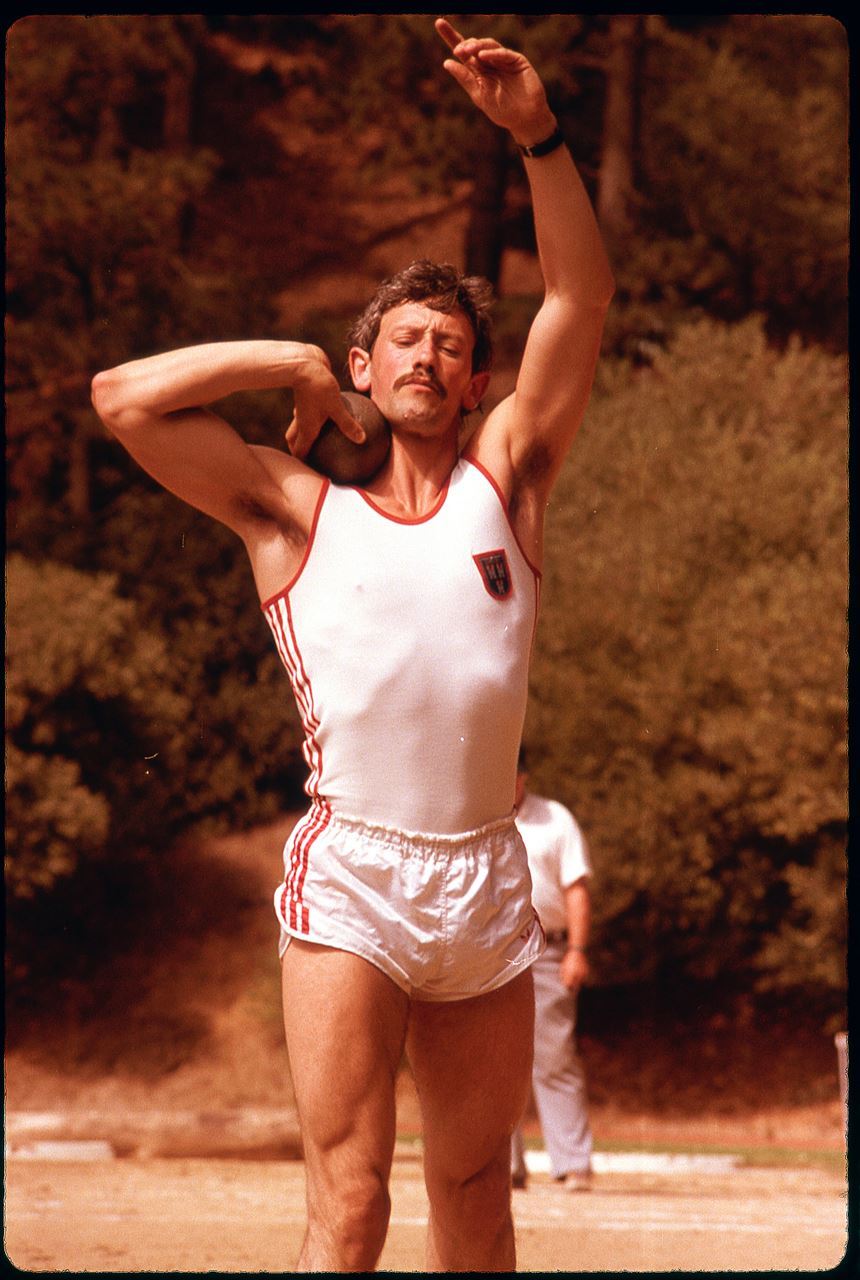
.jpg)
Oliver Murphy, decathlete at Gay Games I in 1982
OLIVER MURPHY: Oliver Murphy from Cork, Ireland captured the Gold Medal at Gay Games I in the Decathlon. He also lost his job as a schoolteacher as a result of his decision to be an out, gay athlete.
The following Letter to the Editor from Mr. Murphy in 1986 to OUT Magazine was in reference to the ban many South Africans faced in international competition at that time as a result of their government’s continued perpetuation and support of apartheid.
Mr. Murphy successfully defended his Decathlon title at Gay Games II, but subsequently lost his battle to AIDS.
“Irish Participation at Gay Games II”
Dear OUT: Here Irish Wit is seen. We boycott Gay Olympics II when we have no team. (With apologies to the Dean…) Well, despite the best efforts of many, both outside and unfortunately within the gay community, to ensure the games would not take place, I am happy to be able to report that as of closing date 1st June, almost 3,700 athletes had signified their intention to compete, at an almost three-fold increase on the numbers participating in Gay Games I.
Also, I personally am boycotting the boycott so there will be an Irish team. Considering the status of civil rights for gay men in Ireland I find it absurd to even consider a boycott on such spurious grounds. I had to resign from my job to compete in the first games so I am all too familiar with Apartheid “Irish-style” as it relates to gays and the jobs they may perform.
Early season competitions indicate I am in good shape to defend my Decathlon title on 15 and 16 August. I shall also be competing in the high-jump and javelin competitions.
The Games will run from Saturday 9 August to Sunday 17 August at various venues in the greater San Francisco area and have again generated tremendous enthusiasm and excitement. Though most competitors will come from within the U.S., large contingents are expected from Canada and Australia. Attendance from Europe is again disappointing. Ironically the last Newsletter of the organizing committee bore the headline “Come out and Play.”
I suppose the lesson here is that one must come out first and this is always a problem. A Dutch soccer team in the last Gay Games dwindled to one player (who guested with the San Francisco team) as the team members realized that participation would mean publicity and how many of us are really that much OUT of the closet.
Yours sincerely, Oliver Murphy
* * *
MAURO BORDOVSKY: Gay Games I imposed a limit on the number of swimmers per team. We had so many swimmers recruited and interested in participating at Gay Games I that we created three teams: Los Angeles, Beverly Hills, and Santa Monica. It was after our successful and fun performances at GGI that we realized what we had, decided to continue as a team, and formed West Hollywood Swim Club. Later, we renamed the Club West Hollywood Aquatics to incorporate Water Polo, Diving, and other aquatic sports.
* * *
